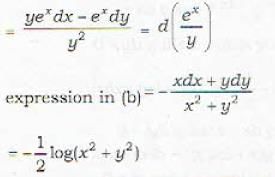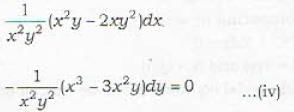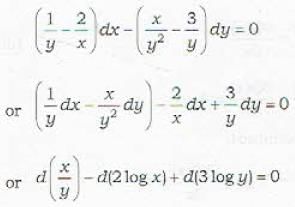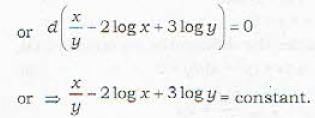Mathematics Exam > Mathematics Questions > Which of the following is not an exact differ...
Start Learning for Free
Which of the following is not an exact differential?
- a)

- b)

- c)

- d)All of the above are exact differentials
Correct answer is option 'A'. Can you explain this answer?
Verified Answer
Which of the following is not an exact differential?a)b)c)d)All of the...
The expression in (a) is not exact. Hence (a) is the correct answer.
Remark : Note that expression in (a)

Comments about Integrating Factor
Definition : Suppose that tne differential equation. M dx + N dy = 0 ...(i)
is not exact but the differential equation

is exact, where μ = F(x, y) for a suitably chosen function F. Then μ is called an integrating factor of the differential equation (i).
Ex. : The differential equation
(3ty + 4xy2) dx + (2x + 3x2y) dy = 0 ...(ii)
is not exact. But if we choose
μ = x2 y.
then the differential equation

becomes exact.
∴ μ = x2 y is an integrating factor of (ii).
Rules for finding an Integrating Factor :
Rule : 1: If Mx ± Ny ≠ 0. and is homogeneous in x and y then the integrating factor is

Ex. : Consider the differential equation
(x2y - 2xy2)dx- (x3 - 3x2y)dy = 0 ...(iii)
verify that
(i) equation (iii) is noi exact and (ii)

Intergrating factor is given by

Hence the equation

should be exact. Now equation (iv) can be written as


Rule : 2. If

is a function of x alone, say f(x), then the integrating factor μ is given by

Rule : 3. If

is a function of y alone, say φ(y), then the integrating factor μ is given by

Remark : Note that expression in (a)

Comments about Integrating Factor
Definition : Suppose that tne differential equation. M dx + N dy = 0 ...(i)
is not exact but the differential equation

is exact, where μ = F(x, y) for a suitably chosen function F. Then μ is called an integrating factor of the differential equation (i).
Ex. : The differential equation
(3ty + 4xy2) dx + (2x + 3x2y) dy = 0 ...(ii)
is not exact. But if we choose
μ = x2 y.
then the differential equation

becomes exact.
∴ μ = x2 y is an integrating factor of (ii).
Rules for finding an Integrating Factor :
Rule : 1: If Mx ± Ny ≠ 0. and is homogeneous in x and y then the integrating factor is

Ex. : Consider the differential equation
(x2y - 2xy2)dx- (x3 - 3x2y)dy = 0 ...(iii)
verify that
(i) equation (iii) is noi exact and (ii)

Intergrating factor is given by

Hence the equation

should be exact. Now equation (iv) can be written as


Rule : 2. If

is a function of x alone, say f(x), then the integrating factor μ is given by

Rule : 3. If

is a function of y alone, say φ(y), then the integrating factor μ is given by

Most Upvoted Answer
Which of the following is not an exact differential?a)b)c)d)All of the...
The expression in (a) is not exact. Hence (a) is the correct answer.
Remark : Note that expression in (a)

Comments about Integrating Factor
Definition : Suppose that tne differential equation. M dx + N dy = 0 ...(i)
is not exact but the differential equation

is exact, where μ = F(x, y) for a suitably chosen function F. Then μ is called an integrating factor of the differential equation (i).
Ex. : The differential equation
(3ty + 4xy2) dx + (2x + 3x2y) dy = 0 ...(ii)
is not exact. But if we choose
μ = x2 y.
then the differential equation

becomes exact.
∴ μ = x2 y is an integrating factor of (ii).
Rules for finding an Integrating Factor :
Rule : 1: If Mx ± Ny ≠ 0. and is homogeneous in x and y then the integrating factor is

Ex. : Consider the differential equation
(x2y - 2xy2)dx- (x3 - 3x2y)dy = 0 ...(iii)
verify that
(i) equation (iii) is noi exact and (ii)

Intergrating factor is given by

Hence the equation

should be exact. Now equation (iv) can be written as


Rule : 2. If

is a function of x alone, say f(x), then the integrating factor μ is given by

Rule : 3. If

is a function of y alone, say φ(y), then the integrating factor μ is given by

Remark : Note that expression in (a)

Comments about Integrating Factor
Definition : Suppose that tne differential equation. M dx + N dy = 0 ...(i)
is not exact but the differential equation

is exact, where μ = F(x, y) for a suitably chosen function F. Then μ is called an integrating factor of the differential equation (i).
Ex. : The differential equation
(3ty + 4xy2) dx + (2x + 3x2y) dy = 0 ...(ii)
is not exact. But if we choose
μ = x2 y.
then the differential equation

becomes exact.
∴ μ = x2 y is an integrating factor of (ii).
Rules for finding an Integrating Factor :
Rule : 1: If Mx ± Ny ≠ 0. and is homogeneous in x and y then the integrating factor is

Ex. : Consider the differential equation
(x2y - 2xy2)dx- (x3 - 3x2y)dy = 0 ...(iii)
verify that
(i) equation (iii) is noi exact and (ii)

Intergrating factor is given by

Hence the equation

should be exact. Now equation (iv) can be written as


Rule : 2. If

is a function of x alone, say f(x), then the integrating factor μ is given by

Rule : 3. If

is a function of y alone, say φ(y), then the integrating factor μ is given by

Free Test
FREE
| Start Free Test |
Community Answer
Which of the following is not an exact differential?a)b)c)d)All of the...
The expression in (a) is not exact. Hence (a) is the correct answer.
Remark : Note that expression in (a)

Comments about Integrating Factor
Definition : Suppose that tne differential equation. M dx + N dy = 0 ...(i)
is not exact but the differential equation

is exact, where μ = F(x, y) for a suitably chosen function F. Then μ is called an integrating factor of the differential equation (i).
Ex. : The differential equation
(3ty + 4xy2) dx + (2x + 3x2y) dy = 0 ...(ii)
is not exact. But if we choose
μ = x2 y.
then the differential equation

becomes exact.
∴ μ = x2 y is an integrating factor of (ii).
Rules for finding an Integrating Factor :
Rule : 1: If Mx ± Ny ≠ 0. and is homogeneous in x and y then the integrating factor is

Ex. : Consider the differential equation
(x2y - 2xy2)dx- (x3 - 3x2y)dy = 0 ...(iii)
verify that
(i) equation (iii) is noi exact and (ii)

Intergrating factor is given by

Hence the equation

should be exact. Now equation (iv) can be written as


Rule : 2. If

is a function of x alone, say f(x), then the integrating factor μ is given by

Rule : 3. If

is a function of y alone, say φ(y), then the integrating factor μ is given by

Remark : Note that expression in (a)

Comments about Integrating Factor
Definition : Suppose that tne differential equation. M dx + N dy = 0 ...(i)
is not exact but the differential equation

is exact, where μ = F(x, y) for a suitably chosen function F. Then μ is called an integrating factor of the differential equation (i).
Ex. : The differential equation
(3ty + 4xy2) dx + (2x + 3x2y) dy = 0 ...(ii)
is not exact. But if we choose
μ = x2 y.
then the differential equation

becomes exact.
∴ μ = x2 y is an integrating factor of (ii).
Rules for finding an Integrating Factor :
Rule : 1: If Mx ± Ny ≠ 0. and is homogeneous in x and y then the integrating factor is

Ex. : Consider the differential equation
(x2y - 2xy2)dx- (x3 - 3x2y)dy = 0 ...(iii)
verify that
(i) equation (iii) is noi exact and (ii)

Intergrating factor is given by

Hence the equation

should be exact. Now equation (iv) can be written as


Rule : 2. If

is a function of x alone, say f(x), then the integrating factor μ is given by

Rule : 3. If

is a function of y alone, say φ(y), then the integrating factor μ is given by


|
Explore Courses for Mathematics exam
|

|
Similar Mathematics Doubts
Question Description
Which of the following is not an exact differential?a)b)c)d)All of the above are exact differentialsCorrect answer is option 'A'. Can you explain this answer? for Mathematics 2025 is part of Mathematics preparation. The Question and answers have been prepared according to the Mathematics exam syllabus. Information about Which of the following is not an exact differential?a)b)c)d)All of the above are exact differentialsCorrect answer is option 'A'. Can you explain this answer? covers all topics & solutions for Mathematics 2025 Exam. Find important definitions, questions, meanings, examples, exercises and tests below for Which of the following is not an exact differential?a)b)c)d)All of the above are exact differentialsCorrect answer is option 'A'. Can you explain this answer?.
Which of the following is not an exact differential?a)b)c)d)All of the above are exact differentialsCorrect answer is option 'A'. Can you explain this answer? for Mathematics 2025 is part of Mathematics preparation. The Question and answers have been prepared according to the Mathematics exam syllabus. Information about Which of the following is not an exact differential?a)b)c)d)All of the above are exact differentialsCorrect answer is option 'A'. Can you explain this answer? covers all topics & solutions for Mathematics 2025 Exam. Find important definitions, questions, meanings, examples, exercises and tests below for Which of the following is not an exact differential?a)b)c)d)All of the above are exact differentialsCorrect answer is option 'A'. Can you explain this answer?.
Solutions for Which of the following is not an exact differential?a)b)c)d)All of the above are exact differentialsCorrect answer is option 'A'. Can you explain this answer? in English & in Hindi are available as part of our courses for Mathematics.
Download more important topics, notes, lectures and mock test series for Mathematics Exam by signing up for free.
Here you can find the meaning of Which of the following is not an exact differential?a)b)c)d)All of the above are exact differentialsCorrect answer is option 'A'. Can you explain this answer? defined & explained in the simplest way possible. Besides giving the explanation of
Which of the following is not an exact differential?a)b)c)d)All of the above are exact differentialsCorrect answer is option 'A'. Can you explain this answer?, a detailed solution for Which of the following is not an exact differential?a)b)c)d)All of the above are exact differentialsCorrect answer is option 'A'. Can you explain this answer? has been provided alongside types of Which of the following is not an exact differential?a)b)c)d)All of the above are exact differentialsCorrect answer is option 'A'. Can you explain this answer? theory, EduRev gives you an
ample number of questions to practice Which of the following is not an exact differential?a)b)c)d)All of the above are exact differentialsCorrect answer is option 'A'. Can you explain this answer? tests, examples and also practice Mathematics tests.

|
Explore Courses for Mathematics exam
|

|
Signup to solve all Doubts
Signup to see your scores go up within 7 days! Learn & Practice with 1000+ FREE Notes, Videos & Tests.




















